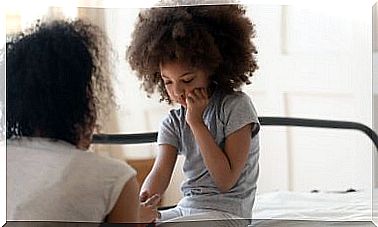Five Things Children Learn From Their Parents

There are five fundamental things that children learn from their parents from an early age that will define their identity permanently. And it is that you learn from imitation, to follow the example and to copy the attitudes of your heroes and models, and that is precisely what we are for our children.
Imitation occurs unconsciously, and remains ingrained in the psyche whether we like it or not; therefore, it is important to make it clear that if we want our children to be ordered, for example, words of petition will be useless if we ourselves have chaos in the home.
Here we will review some attitudes that children learn from their parents and that in general, no matter how much they change as adults, will remain present in their lives.
Five things children learn from their parents
We chose these five things children learn from their parents to exemplify the power of imitation in our children’s lives. These are order, having violent attitudes, being positive or negative, love of study and work, and being fearful.
1.- The order
Being tidy and clean is one of the first lessons children learn at an early age. This aspect is so important that even multiple species of animals teach grooming to their young by example, since they instinctively relate it to survival or health.
For us humans, the same thing happens; an orderly and clean environment provides us with health and peace of mind. Children who live in very hygienic and orderly homes show a penchant for keeping things neat without being constantly ordered to do so.
Likewise, they tend to develop an appreciation for their personal belongings and those of their colleagues or siblings.

2.- Violent attitudes
Regardless of what kind of civic and religious values you instill in your children, specialists assure that a significant percentage of individuals who respond aggressively had negative experiences in their childhood where they witnessed physical or verbal violence.
Remember that violence can take many forms: children who witness screams at home, hear insults, complaints, hateful ideas or racial offenses, etc. All of them are likely to respond unconsciously and aggressively when under stress.
Unfortunately, in cases of domestic violence, many women have stated that they feel physical or verbal abuse by their partner as “normal”, since they affirmed that this is how they saw their father treating their mother and therefore believe that the love manifests itself through this duality of treatment.
3.- Be positive or negative
Many young children, between 4 and 7 years old, report feeling unhappy or suffering from depression. Without entering the area of psychology and understanding that there are particular pathologies, it has been determined that many children have prior analysis with the specialist, what they do is repeat statements and behaviors that they see in their father or mother.
Not surprisingly, all the recommendations for good mental health indicate that we must be positive and instill phrases of self-acceptance in our children. Sentences such as: “We are unhappy”, “We are having a bad time”, “We are not well” or “We will never improve” make a child transform into an insecure adult, without self-esteem and with depressive attitudes.
4.- Love for work and study
The recipe for success in life is a love of study and work, and of course the antithesis is laziness. When children hear their parents talk about how much fun it is to earn a living easily, cheat, or see them wandering around the house, they are sure to find it harder to cope with the responsibilities of adult life.
The same goes for studying and reading. When children see their parents reading the newspaper and books, they will feel the need to imitate them and will request that they buy them stories or something to read. In contrast, in homes where television is watched all day, children tend to take passive attitudes towards learning, and even their grades tend to be lower.

5.- be afraid
Many times nervousness and overprotection towards our children make us inject into their character a certain degree of insecurity and fear. If we always alert them to dangers or possible problems, surely our children as adults will feel exposed to any situation in life.
A variant of fear is the terror of the night or anything that scares in the dark. By talking to them about those topics, we can permanently mark them.
Our attitudes may have the best of intentions, appear unconscious, or seem imperceptible to our children, but many times this is not the case. That is why we must be careful and think that many of our children’s attitudes will be based on what they see at home, since it is proven that children learn from their parents.










